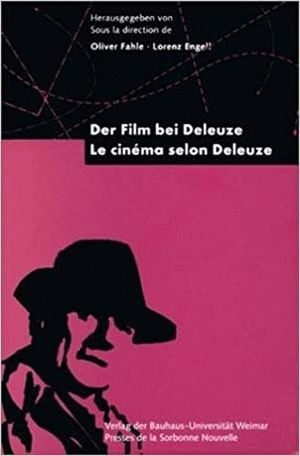Le Cinéma selon Deleuze · Der Film bei Deleuze
Fiche technique
Auteurs :
Oliver Fahle, Lorenz EngellGenres : Essai, Cinéma & télévisionDate de publication (France) : 15 décembre 1997Langue d'origine : FrançaisParution France : 15 décembre 1997Éditeur :
Presses Sorbonne NouvelleISBN : 978-2878541434Résumé : Co-édition Verlag der Bauhaus-Universität Weimar De prime abord, il peut sembler singulier qu'un colloque sur la philosophie du film de Gilles Deleuze se soit tenu à Weimar. Il serait sans doute possible de retracer une filiation débutant avec Nietzsche ; dans son livre sur le philosophe, Deleuze se réfère explicitement à Weimar, devenue un des centres d'études nietzschéennes. Il est plus incongru encore que Weimar n'ait pas découvert Deleuze par le biais de Nietzsche, mais par celui du cinéma. La philosophie du film de Deleuze constitue l'image filmique en image-pensée (pouvant être interprétée comme image pensante), et forge des concepts et des descriptions qui permettent de reconstruire la pensée filmique, qui est une pensée du mouvement et du temps. At the origin of this volume stands an enigma: how can a nearly seven hundred pages long essay on the cinema – The Movement Image (Cinema 1) and The Time Image (Cinema 2) de Deleuze – constitute a « philosophy book »? This diptych must undoubtedly be considered in relation to Deleuze’s entire work. The encounters, bridges and even short-circuits it allows between philosophy and cinema, between concepts and images must be interrogated. However, a guiding line was necessary, even if broken. It unfolds throughout the study precisely where it was not expected to, from the "doctrine of faculties" whose requirements Deleuze – with and against Kant – has introduced since Difference and Repetition. This book aims to analyze the different types of communication between faculties of seeing, speaking and thinking in the cinema, their "discordant agreements" and their always dissonant "re-sequences". Through that, it explores with a new perspective certain fundamental issues raised by The Movement Image and The Time Image such as the transition from one system of image to another, the relation between cinema and language, ethics and politics as considered by Deleuze in the mid-1980s.

